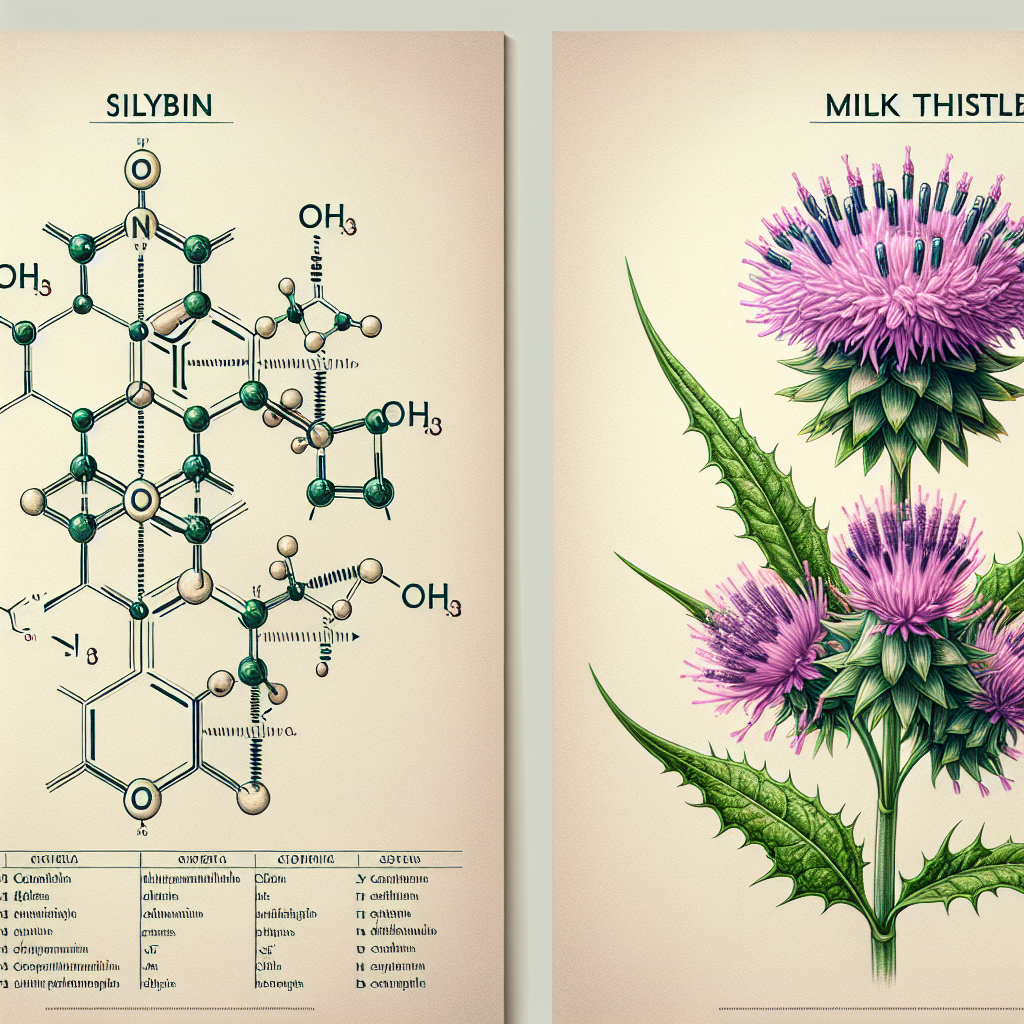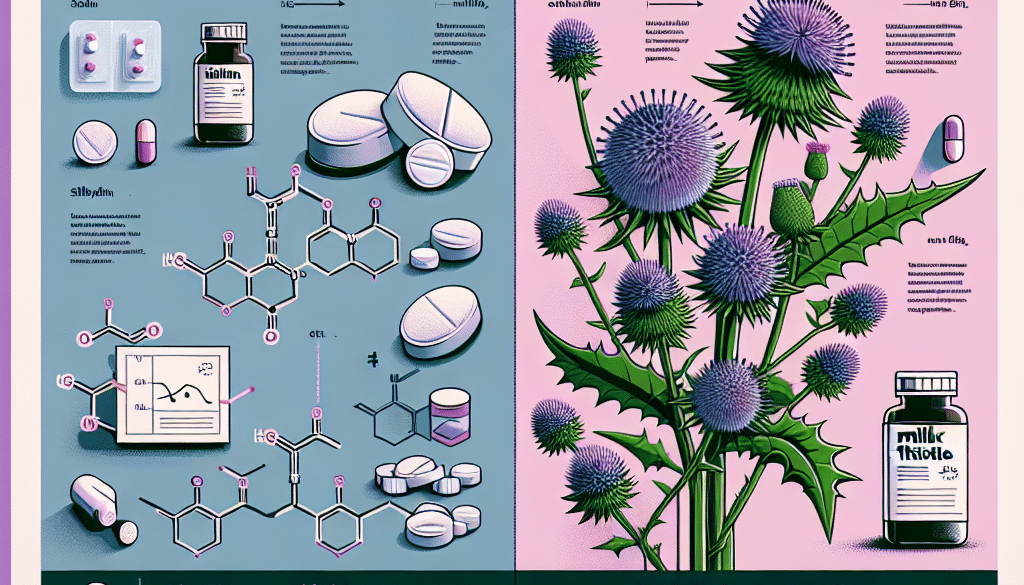Silybin vs Milk Thistle: Differences
-
Table of Contents
- Silybin vs Milk Thistle: Understanding the Differences
- Introduction to Milk Thistle
- What is Silybin?
- Key Differences Between Silybin and Milk Thistle
- Health Benefits of Milk Thistle and Silybin
- Scientific Research and Case Studies
- Choosing Between Silybin and Milk Thistle
- Conclusion: Silybin and Milk Thistle in Perspective
- Discover ETChem’s Protein Products
Silybin vs Milk Thistle: Understanding the Differences

Milk thistle and silybin are often mentioned in the same breath when discussing liver health and natural supplements. However, while they are closely related, they are not the same thing. This article will delve into the differences between silybin and milk thistle, their benefits, and how they are used in various health applications.
Introduction to Milk Thistle
Milk thistle, scientifically known as Silybum marianum, is a flowering plant native to Mediterranean countries. It has been used for over 2,000 years as a herbal remedy for a variety of ailments, particularly liver problems. The active ingredients in milk thistle are a group of plant compounds collectively known as silymarin, which is extracted from the seeds of the plant.
What is Silybin?
Silybin, also known as silibinin, is the most active component of silymarin and is believed to be primarily responsible for the health benefits attributed to milk thistle. Silybin is a flavonolignan, a type of flavonoid, which is a class of compounds known for their antioxidant and anti-inflammatory properties.
Key Differences Between Silybin and Milk Thistle
Understanding the differences between silybin and milk thistle is crucial for anyone considering these supplements for their health regimen.
- Composition: Milk thistle is the whole plant or its extract, containing a variety of compounds, including silybin. Silybin, on the other hand, is a single compound that can be isolated and concentrated from milk thistle extract.
- Potency: Because silybin is a concentrated form of the active ingredient, it is often more potent than milk thistle extract, which contains silybin in lower concentrations.
- Availability: Milk thistle can be found in various forms, such as capsules, tablets, powders, and teas. Silybin is typically available in concentrated supplement form, often as capsules or tablets.
- Research Focus: While both milk thistle and silybin have been the subject of research studies, silybin is often studied more intensively due to its higher potency and direct impact on health conditions.
Health Benefits of Milk Thistle and Silybin
Both milk thistle and silybin are best known for their liver-protective effects, but they offer a range of other potential health benefits as well.
- Liver Health: They are commonly used to treat liver conditions such as hepatitis, cirrhosis, and jaundice, and to protect the liver from toxins like alcohol and certain drugs.
- Antioxidant Properties: As antioxidants, they help combat oxidative stress and may reduce the risk of chronic diseases.
- Anti-inflammatory Effects: Their anti-inflammatory properties may help reduce inflammation in the body, which is a key factor in many health conditions.
- Supporting Digestive Health: Milk thistle and silybin may also promote digestive health by stimulating bile flow and soothing the mucous membranes throughout the body.
Scientific Research and Case Studies
Several studies have highlighted the benefits of silybin and milk thistle. For instance, research has shown that silybin can significantly improve liver function in patients with liver diseases. A study published in the “World Journal of Hepatology” found that silybin treatment resulted in improved liver enzyme levels and overall liver function in patients with alcoholic liver disease.
In another case study, silybin was used as part of a treatment regimen for a patient with mushroom poisoning, which can cause severe liver damage. The patient’s recovery was attributed in part to the administration of silybin, which helped to stabilize liver function and accelerate recovery.
Choosing Between Silybin and Milk Thistle
When deciding whether to use silybin or milk thistle, consider the following factors:
- Purpose of Use: If you are looking for a general supplement to support liver health, milk thistle may be sufficient. However, if you require a more potent intervention, silybin might be the better choice.
- Medical Advice: Always consult with a healthcare provider before starting any new supplement, especially if you have a pre-existing health condition or are taking other medications.
- Quality of Supplement: Look for high-quality supplements that have been tested for purity and potency, and choose reputable brands to ensure you are getting an effective product.
Conclusion: Silybin and Milk Thistle in Perspective
In conclusion, while milk thistle and silybin are closely related, they are not interchangeable. Silybin is the most potent active component found in milk thistle and may offer more concentrated benefits. Both have been shown to support liver health and offer antioxidant and anti-inflammatory properties. When choosing a supplement, consider your specific health needs and consult with a healthcare professional to determine the best option for you.
Discover ETChem’s Protein Products
If you’re interested in enhancing your health regimen with quality protein supplements, consider exploring ETChem’s range of protein products. ETChem is a reputable manufacturer and supplier known for their high-quality collagens, including marine, fish, bovine, chicken, and various types of collagen. Their products are ideal for various industries, including nutraceuticals, pharmaceuticals, cosmeceuticals, and food and beverage. With a focus on neutral taste and instant solubility, ETChem’s offerings can meet all your protein needs.
About ETChem:
ETChem, a reputable Chinese Collagen factory manufacturer and supplier, is renowned for producing, stocking, exporting, and delivering the highest quality collagens. They include marine collagen, fish collagen, bovine collagen, chicken collagen, type I collagen, type II collagen and type III collagen etc. Their offerings, characterized by a neutral taste, instant solubility attributes, cater to a diverse range of industries. They serve nutraceutical, pharmaceutical, cosmeceutical, veterinary, as well as food and beverage finished product distributors, traders, and manufacturers across Europe, USA, Canada, Australia, Thailand, Japan, Korea, Brazil, and Chile, among others.
ETChem specialization includes exporting and delivering tailor-made collagen powder and finished collagen nutritional supplements. Their extensive product range covers sectors like Food and Beverage, Sports Nutrition, Weight Management, Dietary Supplements, Health and Wellness Products, ensuring comprehensive solutions to meet all your protein needs.
As a trusted company by leading global food and beverage brands and Fortune 500 companies, ETChem reinforces China’s reputation in the global arena. For more information or to sample their products, please contact them and email karen(at)et-chem.com today.




